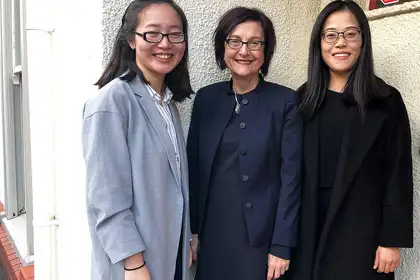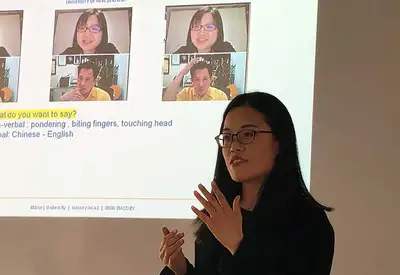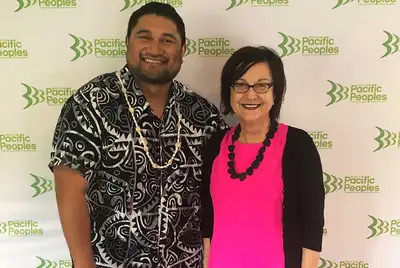
Professor Cynthia White with linguistics PhD students Dai Chujie and Huan Huang.
Learning another language can take years of commitment and effort amid our busy lives. A new online learning innovation pairing students face-to-face with native speakers is helping to speed up progress because it is tailored to the learner’s needs, lifestyle and level.
Linguistics expert and international authority on distance language learning, Professor Cynthia White, recently presented findings on the Synchronous Chinese Online Language Teaching (SCOLT) pilot project she is leading. The project is a partnership between Massey’s School of Humanities and the Beijing Language and Culture University (BLCU), and is part of a joint research centre in applied linguistics which launched two years ago.
The concept is based on tutorials bringing together a trainee Chinese language teacher from BLCU and a Chinese language learner from Massey University in a series of one-to-one online language practice tutorials. Students and tutors reflect on the process after each of the tutorials. These reflections, as well as recordings of the sessions themselves, have become data for investigation in this under-researched area.
The SCOLT method offers numerous advantages, says Professor White, who is also Pro Vice-Chancellor of the College of Humanities and Social Sciences. It allows for personalised, recordable and flexible learning as sessions can be timed to suit the schedules of student and tutor.

PhD student Huan Huang presenting her findings on the communication dynamics of one-to-one language tutoring.
Progress augmented by personalised approach
Other advantages of the one-on-one approach include increased confidence in language learners to speak and not be inhibited by others as they might in a classroom situation. They also receive targeted feedback to address specific areas they want to improve on, or are having difficulty with, and can replay recordings to review their progress, iron out mistakes and practice after the session.
Professor White, who received Ministry of Business, Innovation and Employment (MBIE) Catalyst seeding funding to develop the project with BLCU, says students taking part in the trial particularly liked being able to speak with a native speaker of Chinese with the advantage being that; “the teacher can find the right level for the student.”
Another successful tool used in the trial was the use of photos to prompt natural conversation involving questions and the chance to learn new vocabulary. “It was clear from our focus groups that the photo prompt provides a lot of support for learning and leads to discussing other topics,” she says. The approach is both structured and natural, with the possibility of authentic conversation to flow as the rapport develops between tutor and learner.
While there are many digital apps for language learning, the key issue is people’s willingness to learn and finding a way that suits their needs, says Professor White, who hopes the method will be adapted to other languages.
She was joined by doctoral students Dai Chujie and Huan Huang in a presentation to government and education sector professionals at the New Zealand China Friendship Society in Wellington last month. The students’ research is exploring aspects of the role of communication dynamics, such as verbal cues and responses, facial expressions and body language in online learning scenarios.

Professor Cynthia White with Ta'i Richard, from the Ministry of Pacific Peoples, at a fono (conference) in Auckland on language revitalisation.
Supporting languages of the Pacific
Professor White also recently presented at the the Lalanga Fou Languages and High Tech Fono in Auckland, hosted by the Ministry for Pacific Peoples. She spoke to Pacific communities and government representatives on her research into technology for language maintenance and revitalisation for indigenous languages.